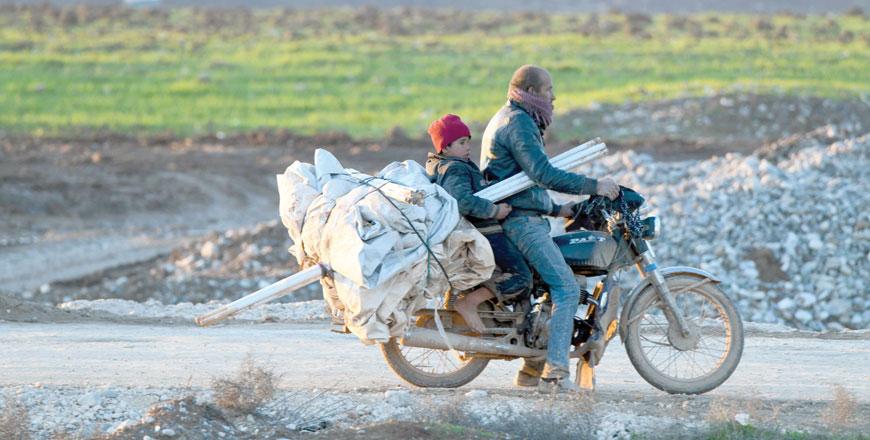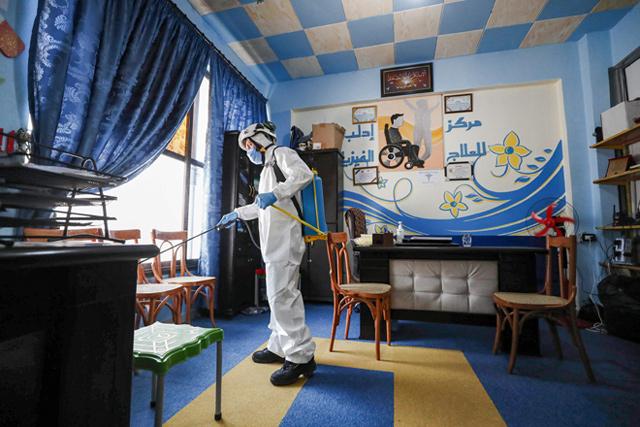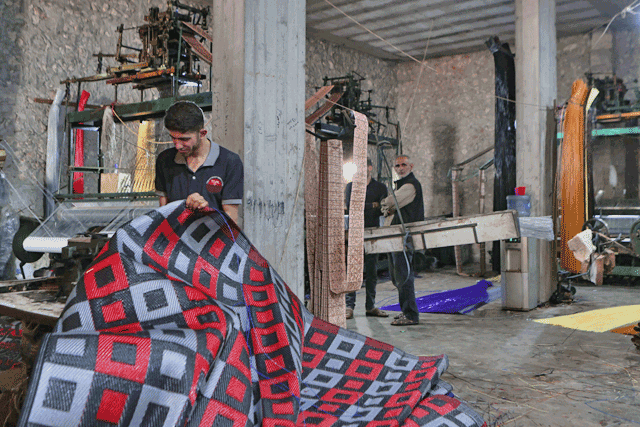You are here
After fleeing war, Syrian families say 'nowhere to go'
By AFP - Feb 09,2020 - Last updated at Feb 09,2020

A man, riding his motorcycle with a child, arrives at a camp for the internally displaced near Dayr Ballut, near the Turkish border in the rebel-held part of Aleppo province on Sunday (AFP photo)
MAARET MISRIN, Syria — Exhausted from days of driving in search of shelter in northwest Syria, 38-year-old Ghossoon has no idea where her family will go after fleeing ongoing violence.
"Thank God we have this car to sleep in, even if it's not comfortable," she said, after parking the grey people-carrier by the side of the road.
"We've spent two nights in it so far," she said, sitting on a blanket and leaning back against the vehicle in Maaret Misrin, a town in Idlib province.
"This will be the third night. We'll stay in it again because we can't find anywhere else to go," she added.
By her side, Ghossoon's husband crouches with their baby daughter in his arms, while their young son, who is wrapped up in a winter coat, clutches a packet of plain biscuits.
The Syrian army has pounded Syria’s last major rebel bastion over the past two months, forcing more than 580,000 people from their homes and onto the roads.
In the extremist-ruled region of some three million people, entire families have headed north in cars piled high with blankets, chairs and pans as they seek to survive the winter.
But many are struggling to find protection from the cold along the Turkish border, which was closed by Ankara in response to waves of displacement earlier in Syria’s nine-year civil war.
‘More people
than homes’
Ghossoon and her husband have stuffed warm blankets and pillows in the back of their car, while they have strapped large plastic woven mats to the roof.
“We went to the camps, but there wasn’t any space there,” Ghossoon said.
“We looked for a home but the rent was really expensive. Where am I supposed to find the money?”
The average monthly rent in Idlib’s northern countryside was around $150 per apartment before the latest wave of displacement; the few available are now priced as high as $350, according to an AFP correspondent.
On Wednesday, eight organisations called for an immediate ceasefire, describing the situation as a “humanitarian catastrophe”.
Bahia Zrikem from Humanity Inclusion said “there are simply more people than [there are] homes available”.
“Many of those who have fled are sleeping in their cars or camping by the side of the road.”
In a newly-established camp on the edge of Maaret Misrin, tents made available for newcomers are already packed.
Entire families are sleeping on the muddy floor, with carpets, mattresses, and household appliances stacked around them, an AFP correspondent said.
Designed to host 350 families, the camp is now brimming with more than 800, and people keep flooding in.
Mustafa Haj Ahmad arrived in the camp only days ago along with 30 relatives, including his wife and seven children.
The 40-year-old said he fled fighting near his hometown of Sarmin carrying nothing but clothes.
When he arrived in the camp, he couldn’t find a tent for his family.
“We have been sleeping under trees for the past two days,” he told AFP.
‘Roof over our heads’
Even though Mustafa can’t afford to rent a house closer to the Turkish border, he said he is determined to head there.
“We will sleep in the olive groves, I don’t know what else we can do.”
According to the Norwegian Refugee Council, displacement camps are at five times their capacity and rental prices have skyrocketed in towns in Syria’s northwest.
This has forced Alaa Aboud, 38, to relocate his family from northern Idlib to the provincial capital, only a few kilometres away from the frontline.
He now lives with his wife, five children, his two parents and his brother in an unfinished building in Idlib city.
The rudimentary cinderblock home doesn’t have windows or doors installed.
The floors don’t have tiles and the walls need painting.
A carpet and cushions are laid out on the floor.
“This place is better than others, at least we have a roof over our heads,” Alaa said.
“But if the roof is destroyed over us, then it would be better to live in the mud,” he added, fearing attacks on Idlib city.
Preparing for an eventual offensive on the city itself, he said he is looking for a plot of land further north, where he can pitch a tent.
But he said he hopes he won’t need it.
“May God spare us,” he said.
“We are tired.”
Related Articles
MAARET MISRIN, Syria — After surviving months of bombardment, Nasr Sultan now fears his 10 children may starve or catch coronavirus as a div
IDLIB, Syria — In the car park and under the stands of a football field in Idlib city, northwestern Syria, families with nowhere to go after
HEZREH — At a rubbish dump in northwest Syria, Mohammed Behlal rummages for plastic to be sold to recyclers and transformed into floor rugs

















